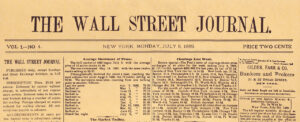Prigozhin, Navalny, and Gershkovich
The top of the Wall Street Journal’s website states: “Evan Gershkovich: 11 Months Detained.” The statement refers to the Journal’s reporter who has been incarcerated by Russian authorities on accusations that he engaged in illegal spying on Russia.
In March 2023, Gershkovich was living in Russia and writing articles for the Journal that were critical of Russia’s war on Ukraine. At the same time that he was criticizing the Russian regime, according to the Journal, he was enjoying social life in Russia, including hanging out at Moscow dive bars.
According to Wikipedia, on March 29, 2023, the Russian Federal Security Service arrested Gershkovich for having information on a “Russian defence enterprise.”
U.S. officials deny that Gershkovich is a U.S. spy, but of course their denials are worthless since they would lie if Gershkovich is in fact a spy. Moreover, it is common knowledge that the CIA maintains assets within the U.S. mainstream press. (See the CIA’s Operation Mockingbird.)
Journal executives also deny that Gershkovich is a spy, but of course their denials are also worthless for two reasons: (1) They too would almost certainly not confess the truth if Gershkovich is in fact a spy; and (2) If Gershkovich is a spy, it is likely that he wouldn’t disclose that fact to his employer.
My own belief is that Gershkovich isn’t a spy but instead is a retaliatory victim of U.S. foreign policy toward Russia. In other words, he is a classic example of how the U.S. government makes life unsafe for American citizens.
Throughout this controversy, there have been two important questions that have not been answered by Journal executives: (1) What Gershkovich was doing, if anything, at the time of his arrest that would cause Russian officials to charge him with espionage; and (2) Why the Journal didn’t pull Gershkovich out of Russia when the Journal began publishing his critical articles.
By this time, the Journal has to be aware of the circumstances surrounding Gershkovich’s arrest. There is little doubt that he has related those circumstances to his Russian lawyers, who would naturally have related them to Journal officials.
So, why hasn’t the Journal publicized Gershkovich’s side of the story? Ordinarily, that’s what an innocent person does — he gets his story out to create sympathy for himself. If there wasn’t anything nefarious about what Geshkovich was doing that Russian officials could point to, why not publicize that fact widely? Why keep people guessing?
My hunch is that the reason for the Journal’s silence might be that Gershkovich did actually get caught holding some illegal documents that were handed to him by someone he considered a trusted Russian source. In other words, I suspect that he was the victim of a sting operation by Russian officials.
Why would U.S. officials and Journal officials be reluctant to criticize that type of sting operation? Because it would be fairly obvious that such a sting operation would be similar to the sting operation that U.S. DEA officials carried out against Russian arms dealer Viktor Bout in Thailand. In other words, Americans might figure out that the Russians were simply retaliating against an American citizen in the same way that U.S. officials targeted a Russian citizen. (See, for example, my article “Time to Revisit the Viktor Bout Case.”)
The other question is: Why didn’t Journal executives pull Gershkovich out of Russia when it began publishing his articles criticizing the Russian war on Ukraine? After all, one could forgive the 31-year-old Gershkovich for being young and naive about the Russian regime and believing that Vladimir Putih would respect his “free speech” rights. But surely the older executives at the Journal are not that innocent and naive about the Russian regime.
After all, this is a regime that the U.S. government, operating through NATO, intentionally provoked into invading Ukraine in a war that has taken the lives of tens of thousands of Russian soldiers and brought untold grief to Russian families all across the nation. And let’s not forget the brutal sanctions that the U.S. government has imposed on Russia, with the dual aim of bringing massive impoverishment to the Russian people and regime change to the Putin regime.
Why wouldn’t Journal officials realize that there was no possibility that Russian officials would look kindly on an American journalist who was working for a rightwing American publication that was publishing articles that were critical of Russia’s invasion of Ukraine?
And then there are the presumed state-sponsored assassinations and extra-judicial executions of Yevgeniy Prigozhin, the chief of Russia’s Wagner mercenary group, and Alexei Navalny, who wanted to run against Putin for president. Yes, it’s true that these presumed murders took place after Gershkovich’s arrest but surely Journal executives understood the brutality of any authorItarian regime, especially one that is losing tens of thousands of troops in a vicious war that the U.S. government knowingly provoked?
So, the Wall Street Journal officials have some explaining to do: Why have’t they explained the circumstances surrounding Gershkovich’s arrest? And why did they leave Gershkovich in danger instead of pulling him out of Russia?



